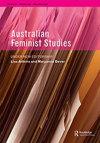The Queer Temporality of CandidaHomo Biotechnocultures
IF 1.3
4区 社会学
Q2 WOMENS STUDIES
引用次数: 2
Abstract
ABSTRACT This article weaves together microsocial interactions, evolutionary theories of community and queer understandings of family, kinship and intimacy to grasp some of the complex microbiopolitics of the CandidaHomo ecology. I discuss contemporary scientific understandings of Candida albicans sociality as highly tactile and sensual, bodies constantly in touch with surfaces – chemicals, cells, tissues, prosthetics. I explore the highly contested field of evolutionary theories of social selection, including biogenetic kin selection and its biases about reproduction, intimacy and care. CandidaHomo ecologies are woven through queer kinship that is biological, but not genetic; embodied, but not essentialist. Queer communities, founded on choice and more-than-biological recognition, are considered as an alternative to dominant gene-centric kinship theories. These communities are intimate, performative and more-than-human, emerging from necessity and constantly co-created. However, homonormativity and biogenetic exclusion lurk in the closet of contemporary families of choice. I consider Luce Irigaray’s figuration of eros as a visceral and tactile reorientation of relatedness and care towards CandidaHomo kind, always already formed through impersonal intimacies and caresses. Finally, the artwork Surface Dynamics of Adhesion (2015) is discussed as a material-semiotic resolution and ‘technology’ for making kin, as Donna Haraway might say.CandidaHomo生物技术疫苗的酷暑
摘要本文将微观社会互动、群落进化理论以及对家庭、亲缘关系和亲密关系的奇怪理解交织在一起,以了解CandidaHomo生态中的一些复杂的微生物政治。我讨论了当代科学对白色念珠菌社会性的理解,即高度触觉和感官,身体不断与表面接触——化学物质、细胞、组织、假肢。我探索了社会选择进化理论中备受争议的领域,包括生物遗传的亲属选择及其对生殖、亲密和关怀的偏见。CandidaHomo生态是通过奇怪的亲缘关系编织而成的,这种亲缘关系是生物学的,但不是遗传的;具体化的,但不是本质主义的。酷儿群体建立在选择的基础上,而不仅仅是生物识别,被认为是显性基因中心亲属关系理论的替代品。这些社区是亲密的、表演性的,不仅仅是人类的,是从必要中产生的,是不断共同创造的。然而,同源性和生物成因排斥潜伏在当代选择家庭的壁橱里。我认为Luce Irigaray对性爱的塑造是对CandidaHomo类型的关系和关怀的一种发自内心和触觉的重新定位,这种关系和关怀总是通过非个人的亲密和爱抚形成的。最后,正如Donna Haraway可能会说的那样,艺术品《粘附的表面动力学》(2015)被讨论为一种材料符号分辨率和制作亲属的“技术”。
本文章由计算机程序翻译,如有差异,请以英文原文为准。
求助全文
约1分钟内获得全文
求助全文
来源期刊

Australian Feminist Studies
WOMENS STUDIES-
CiteScore
2.50
自引率
0.00%
发文量
7
期刊介绍:
Australian Feminist Studies was launched in the summer of 1985 by the Research Centre for Women"s Studies at the University of Adelaide. During the subsequent two decades it has become a leading journal of feminist studies. As an international, peer-reviewed journal, Australian Feminist Studies is proud to sustain a clear political commitment to feminist teaching, research and scholarship. The journal publishes articles of the highest calibre from all around the world, that contribute to current developments and issues across a spectrum of feminisms.
 求助内容:
求助内容: 应助结果提醒方式:
应助结果提醒方式:


